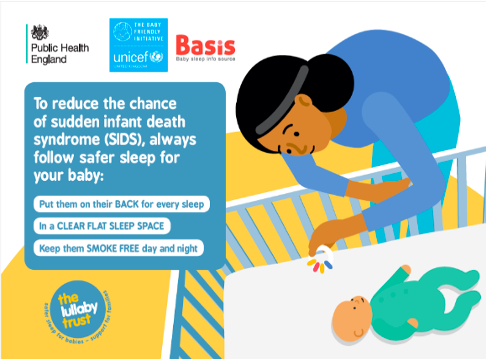Safer Sleep Week: SIDS, SUDI, and Applied Anthropology
By Sophie Lovell-Kennedy, Sarah Turner and Lenka Medvecová Tinková ~
This week, the 11th – 17th of March, is Safer Sleep Week in the UK. Safer Sleep Week is a national awareness campaign run by The Lullaby Trust that raises awareness of Sudden Infant Death Syndrome or SIDS, and Sudden Unexpected Death in Infancy or SUDI, and spreads advice to prevent it. The Durham Infancy and Sleep Centre (DISC) is a research centre within the Anthropology Department at the University of Durham. For nearly 25 years, researchers at DISC have studied sleeping babies, and parenting behaviours, and applied anthropological knowledge to inform infant sleep guidance around the world, including the UK Safer Sleep Guidance.
Each year in England and Wales around 300 infants under one year of age die suddenly and unexpectedly. These cases of infant death are called SUDI. Of these 300 cases, some are explainable, and others are unexplainable. Deaths that are unexplainable following an investigation and autopsy are referred to as SIDS; SIDS is a category of exclusion. Most SUDI cases occur when a baby is sleeping and when the sleep environment is unsafe.
Alongside contributing to national guidelines, DISC applies anthropological knowledge to help parents and practitioners care for their babies every day through Basis, the Baby and Sleep Info Source. Basis was created in 2011 and was then funded by the Economic and Social Research Council ‘Follow-on-Fund’. Originally a website to disseminate anthropologically informed advice about biologically normal infant sleep, Basis now trains hundreds of practitioners in normal infant sleep and safer infant sleep every year, providing anthropologically informed research to help people make informed choices about their infants.
The DISC team work hard to disseminate their research, attending conferences and giving talks about normal and safe infant sleep to a wide range of audiences, and thus it is vital that all research undertaken at DISC is translated into accessible language for all. Most recently, Sophie Lovell-Kennedy, one of the Co-Managers of DISC, spoke at the Lambeth Breastfeeding Network Study Day on the 11th of March 2024. The DISC team also attended the UNICEF Baby Friendly Initiative Conference in November 2023. Basis is a well-known and trusted organisation for many seeking guidance about normal and safe infant sleep, and the Basis logo features alongside Public Health England, UNICEF, and the Lullaby Trust on UK National Safer Sleep materials.

Currently, the DISC team is undertaking a multi-agency working approach to SUDI prevention in the North East of England. Last year DISC trained those working with families in County Durham, and the report for that can be found here. The feedback for this project was overwhelmingly positive. This year, DISC have rolled out the intervention in Northumberland and are currently evaluating it. The DISC team have also been working alongside Amma, a Glaswegian birth companions’ charity, to understand the living conditions of mothers and infants in temporary asylum accommodation.
Sophie is one of the Durham Infancy and Sleep Centre Co-Managers, and her own PhD ties into DISC’s work in Northumberland. Sophie is looking at the barriers to following safer sleep guidelines, and working with families to co-produce a tangible intervention that facilitates safer sleep. Her project is informed by anthropology as she will be using anthropological evidence to underpin the intervention, as well as the theories behind the project.
Sarah Turner, a PhD student working within DISC, is seeking to explore the role and involvement of young fathers (aged 16-25 years) living in the UK in infant caregiving and to investigate if young fathers are viable for SIDS/SUDI prevention by undertaking qualitative research. Currently there is limited research on fathers’ caregiving practices and extremely limited research specifically for young fathers from a safer sleep perspective. It is known that young fathers are a marginalised group who often face additional social, cultural, environmental, and economic barriers. Understanding young fathers’ experiences could contribute to the development of initiatives to promote inclusivity of safer sleep information to young fathers.
Lenka Medvecová Tinková, another PhD student at DISC, focuses on toddler sleep and falling asleep in the context of family, society, and history in the Czech Republic. Through multi-methodological research, Lenka examines parent-child interactions in the context of sleep and seeks to explore the practice of uspávání and its impact on toddlers’ sleep, as well as the social debate on this topic. The term uspávání means different activities which help/guide children fall asleep and sleep calmly, such as rocking, feeding, cuddling, talking, reading fairytales, or lying down with the child and waiting in silence until the child falls asleep. Helping children fall asleep is considered a negative sleep association in some countries, and this project aims to fill the gap in the literature about uspávání, which is part of many families’ sleep routine.
The work done at DISC, and by Basis, demonstrates how anthropological research can be used to inform public health and the medical world. Indeed, DISC and BASIS show how evolutionary and medical anthropology have the potential to inform public health and generate meaningful change in people’s lives.
Sophie Lovell-Kennedy is a PhD Candidate and Co-Manager of the Durham Infancy and Sleep Centre. Sarah Turner and Lenka Medvecová Tinková are both PhD Candidates at Durham University.
